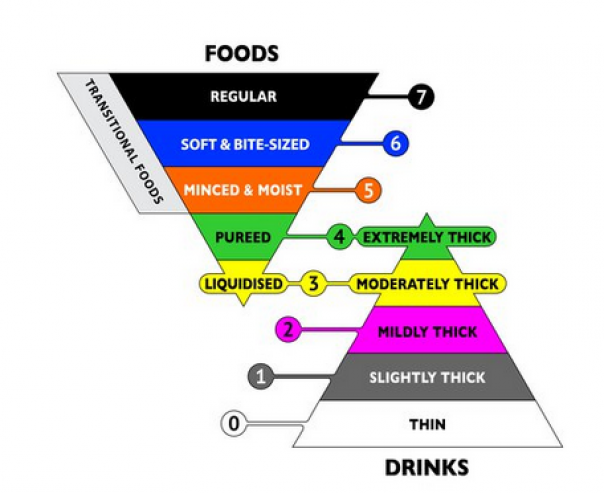
In the past two years, two patients have died due to “imprecise terms for fluid thickening and modified food texture as a result,” which have ‘confused’ patients, carers and healthcare staff.
A further five patients required ‘emergency help’ for choking and aspiration pneumonia, while another 270 reported ‘no or low harm.’
As such, the NHS is calling on “all organisations providing NHS funded-care for patients who have dysphagia or need the texture of their diet modified for other reasons, to hang their labelling and instructions accordingly” and as soon as possible.
Asking them to start immediately and to completely “transition from the current range of food and drink texture descriptors to IDDSI framework” by 1 April 2019, the NHS provides a range of resources here: https://improvement.nhs.uk/resources/transition-to-iddsi-framework/
Speaking to CSC, national chairman of the Hospital Caterers Association (HCA), Stewart McKenzie, commented: “The HCA has been represented on the UK International Dysphagia Diet Standardisation Initiative (IDDSI) Expert Reference Group since its inception in 2016.
“We believe that having precise terminology for the classification of food textures is essential to stop inappropriate foods or liquids being given to patients with swallowing difficulties.
“As an association, we will continue to work hard with speech and language therapists, dietitians and caterers to ensure that the IDDSI standards are well advertised and adopted across the NHS, allowing patients to be fed safely and correctly according to their individual needs.”
Head of external affairs at the British Dietetic Association (BDA), Joanna Instone, added: "The BDA worked closely with the NHS Improvement Alert team to put this Patient Safety Alert together.
"It has been recognised that recently there have been a number of NRLS incidents including two deaths due to misunderstandings about what foods and drinks are suitable for people with dysphagia (problems with swallowing food and drink) who need a ‘soft diet’.
"The term ‘soft’ can mean many things to many people and hence the confusion in a care setting. To help prevent this confusion in the future, a new standard terminology framework called the International Dysphagia Diet Standardisation (IDDSI) is being introduced across the NHS which gives precise descriptions of suitable food and drink textures and methods for checking that the texture is correct before giving the food and drink to patients.
"The Alert suggests that the transition to the new IDDSI framework is carefully planned and refers readers to some excellent resources available on the BDA website. Importantly, the Alert also mentions the care of people who do not have dysphagia, but who may also need food of a softer texture than normal which is easier to chew (such as elderly people with no teeth). It says that the cause of these patients problem with eating needs to be investigated then corrected and they will be returned to normal foods as soon as possible.
"The BDA is fully supportive of this Alert and dietitians are closely involved in the work to make sure that incidents like those described do not happen again."